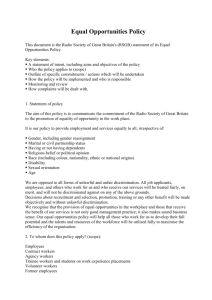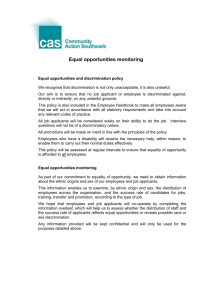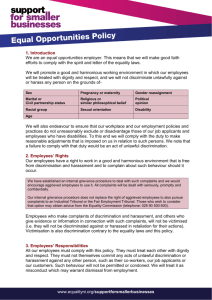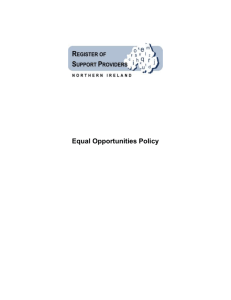MODEL COMPLAINTS PROCEDURE
advertisement
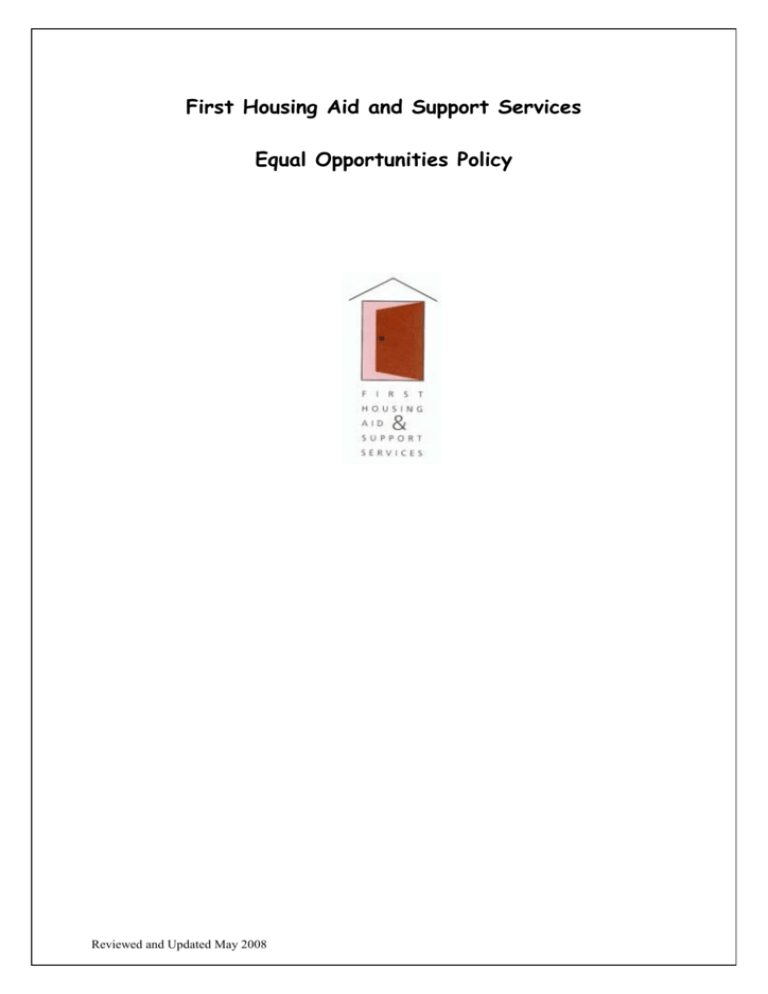
First Housing Aid and Support Services Equal Opportunities Policy Reviewed and Updated May 2008 First Housing Aid and Support Services is committed to ensuring that the talents and resources of all its participants are utilised to the full. We are a cross community non-party political body committed to tackling disadvantaged in housing, and associated support needs. 1. Policy Statement The aim of this policy is to communicate the commitment of the chief officer, Board of Directors and senior management team to the promotion of equality of opportunity in First Housing Aid & Support Services It is our policy to provide employment equality to all, irrespective of: Gender, including gender reassignment Marital or civil partnership status Having or not having dependants Religious belief or political opinion Race (including colour, nationality, ethnic or national origins, being an Irish Traveller) Disability Sexual orientation Age We are opposed to all forms of unlawful and unfair discrimination. All job applicants, employees and others who work for us or use our services will be treated fairly and will not be discriminated against on any of the above grounds. Decisions about recruitment and selection, promotion, training or any other benefit will be made objectively and without unlawful discrimination. We recognise that the provision of equal opportunities in the workplace is not only good management practice, it also makes sound business sense. Our equal opportunities policy will help all those who work for us to develop their full potential and the talents and resources of the workforce will be utilised fully to maximise the efficiency of the organisation. 2. Scope of Policy Accordingly, First Housing Aid and Support Services has a policy of equality of opportunity which extend to: Job applicants and potential applicants Employees including Agency workers 2 Trainee workers and students on work experience or placements Volunteer workers Service Users 3. Equality commitments We are committed to: Promoting equality of opportunity for all persons Promoting a good and harmonious working environment in which all persons are treated with respect Preventing occurrences of unlawful direct discrimination, indirect discrimination, disability discrimination, harassment and victimisation Fulfilling all our legal obligations under the equality legislation and associated codes of practice Complying with our own equal opportunities policy and associated policies Taking lawful affirmative or positive action, where appropriate Regarding all breaches of equal opportunities policy as misconduct which could lead to disciplinary proceedings. 4. Implementation The chief officer has specific responsibility for the effective implementation of this policy. Each member of the board and all managers and team leaders also has responsibilities and we expect all our employees to abide by the policy and help create an equality environment which is its objective. In order to implement this policy we shall: Communicate the policy to employees, job applicants and relevant others Incorporate specific and appropriate duties in respect of implementing the equal opportunities policy into job descriptions and work objectives of all staff Provide equality training and guidance as appropriate, including training on induction and management courses. Ensure that those who are involved in assessing candidates for recruitment or promotion will be trained in non-discriminatory selection techniques Incorporate equal opportunities notices into communications practices Obtain commitments from other persons or organisations such as subcontractors or agencies that they too will comply with the policy in their dealings with our organisation and our workforce 3 Ensure that adequate resources are made available to fulfil the objectives of the policy. 5 Monitoring and review We will establish appropriate information and monitoring systems to assist the effective implementation of our equal opportunities policy. The effectiveness of our equal opportunities policy will be reviewed as necessary and at least annually. Action will be taken to amend the policy as necessary. For example, where monitoring identifies an under-representation of a particular group or groups, we shall develop an action plan to address the imbalance. 6 Complaints Employees who believe that they have suffered any form of discrimination, harassment or victimisation are entitled to raise the matter through the agreed procedures In the case of users of the service, an organisation or a member of the public this will be via our Complaints Procedure. In the case of all employees this will be via the Grievance Procedure. A copy of these procedures is available from any of our offices or projects. All complaints of discrimination will be dealt with seriously, promptly and confidentially. In addition to our internal procedures, employees have the right to pursue complaints of discrimination to an industrial tribunal or the Fair Employment Tribunal under the following anti-discrimination legislation: Sex Discrimination (Northern Ireland) Order 1976, as amended Disability Discrimination Act 1995, as amended Race Relations (Northern Ireland) Order 1997, as amended Employment Equality (Sexual Orientation) Regulations (Northern Ireland) 2003 Fair Employment and Treatment (Northern Ireland) Order 1998, as amended Employment Equality (Age) Regulations (Northern Ireland) 2006 Equal Pay Act (Northern Ireland) 1970, as amended. However, employees wishing to make a complaint to a tribunal will normally be required to raise their complaint under our internal grievance procedures first Every effort will be made to ensure that employees who make complaints will not be victimised. Any complaint of victimisation will be dealt with seriously, promptly and confidentially. Victimisation will result in disciplinary action and may warrant dismissal. 4
